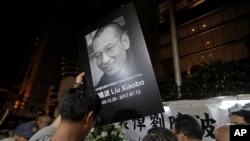U.S. House Foreign Affairs Subcommittee Chairman Christopher Smith said at a hearing Friday that the death of Chinese dissident and Nobel Peace laureate Liu Xiaobo was a "catastrophic loss for China, and really, the entire world."
Smith described China's imprisonment of Liu in 2009 as a "death sentence" and said China's role in his death should not be forgotten.
"No nation should be judged entirely by crimes of the past, but this crime, the death and silencing of Liu Xiaobo, should follow the Chinese Communist Party like an unwashable permanent stain," Smith said.
House Foreign Affairs Committee Chairman Ed Royce issued a statement Friday saying Liu efforts to promote democracy "were not in vain."
"His sacrifice and death while in the custody of the Chinese government while serving an unjustified 11-year sentence has shined a light on the sad state of human rights in China," Royce said.
Chinese dissident and Initiatives for China President Yang Jianli testified at the hearing that Liu "faced one of the most evil and most inhumane regimes in the history of mankind" and added "the Chinese Communist regime is responsible for Liu Xiaobo’s worsening health and for his death."
Yang, who resides in the U.S., accused Western nations of adopting an "appeasement policy" to address China's human rights abuses, in effect making them "accomplices of Liu Xiaobo's slow murder."
Yang warned if world leaders continue to "acquiesce" to China,"more human rights activists will languish and disappear in Chinese prisons."
The subcommittee hearing, titled "The Tragic Case of Liu Xiaobo," comes hours after Chinese Foreign Ministry spokesman Geng Shuang said the awarding of the Nobel Peace Prize to Liu in 2010 was "blasphemy."
"Conferring the prize to such a person goes against the purposes of this award. It's a blasphemy of the peace prize," Geng said.
Liu, China's best-known human rights prisoner, died Thursday at age 61 following a high-profile battle with liver cancer that made his death as controversial as his life.
He spent his last eight years as a prisoner of conscience and died at a hospital in Shenyang, China, where he had been moved from his prison cell in the final stage of his illness. The judicial bureau in Shenyang announced the cause of death as "multiple organ failure."
Thursday, President Donald Trump was deeply saddened to learn of the passing of Liu, a White House statement released Thursday said.
"The President’s heartfelt condolences go out to Liu Xiaobo’s wife, Liu Xia, and his family and friends," the statement said.
U.S. Ambassador to China Terry Branstad said, "China has lost a deeply principled role model who deserved our respect and adulation, not the prison sentences to which he was subjected."
The leader of the Norwegian Nobel committee said the Chinese government bore a "heavy responsibility" for his death. "We find it deeply disturbing that Liu Xiaobo was not transferred to a facility where he could receive adequate medical treatment before he became terminally ill," said Berit Reiss-Andersen. "The Chinese Government bears a heavy responsibility for his premature death," she said in an emailed statement.
China has lodged complaints against Germany, France, the U.S. and the United Nations human rights high commissioner over criticism about the handling ofLiu's death.
Foreign ministry spokesman Geng blasted "certain countries" for interfering in China's "judicial sovereignty."
"China is a country under the rule of law. The handling of Liu Xiaobo's case belongs to China's internal affairs, and foreign countries are in no position to make improper remarks," Geng said.
The ruling Communist Party newspaper said Liu liveda "tragic life." The Global Times said, "Lui's last days were politicized by the forces overseas. They used Liu's illness as a tool to boost their image and demonize China."
U.S. Secretary of State Rex Tillerson has called for Chinato release Liu's widow from house arrest. "I call on the Chinese government to release Liu Xia from house arrest and allow her to depart China, according to her wishes."
"Even as Liu Xiaobo's illness worsened, the Chinese government continued to isolate him and his family, and denied him freely choosing his medical treatment," said Sophie Richardson, China director of Human Rights Watch. "The Chinese government's arrogance, cruelty, and callousness are shocking - but Liu's struggle for a rights-respecting Democratic China will live on."





